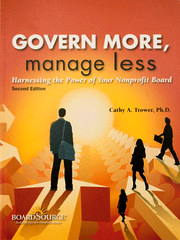The culture of niceness can keep us from leaning into the important stuff.
When people join nonprofit boards, they’re usually guided by passion—passion for the mission, the cause, the community, or the leadership. Occasionally, of course, boards recruit new members simply to fill a spot. Today, though, I want to talk about people fueled by passion with high hopes of helping an organization thrive, only to find themselves in a morass after a few meetings.

Board effectiveness is an inside job.
Leading with culture.
No one ever said governing is easy. Too often, we reach for technical solutions to “fix” problems when the real secret to effective governance lies beyond meeting the three duties. (Though they’re a great start.) The key to board effectiveness is culture, which helps to forge a team that sticks together over the distance.
Culture can be tricky, though. Here are a few tips from the field to help leaders build an intentional board culture.
3 steps to building board culture.
- Establish what we call the “helpful ways to work together.” This is a set of guideposts to support active engagement and create a sense of belonging for all members. Here’s the set we use with our clients. Pro tip: keep them posted during meetings for folks to see. You’ll be amazed at how frequently people will refer to them.
- Embrace the POWER of the helpful struggle. Board meetings are the place where the board collectively makes decisions. Meetings are for deciding rather than describing. Decisions benefit from inviting conflict, listening to the voice of doubt, “thrashing” around a bit, and wrestling with important questions. By recognizing that the struggle can be helpful, we give ourselves permission to engage in healthy conflict, see tension for what it is, and allow friction to help us gain traction to move forward effectively.
- Be curious. This is by far the most challenging attribute to nurture. People are usually recruited for their expertise, experience, knowledge, or connections. However, boards benefit most when members are courageously curious and willing to ask tough questions. This enables the board to rumble together and provides an effective and efficient decision-making service to the organization.
Stay curious and lead with purpose, friends!
Kimberley
 Additional resources to dig deeper:
Additional resources to dig deeper:
